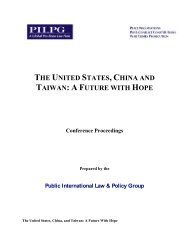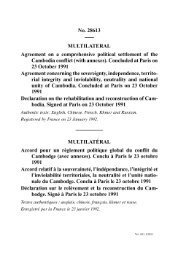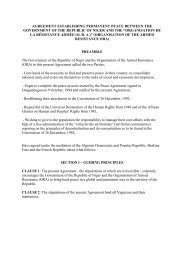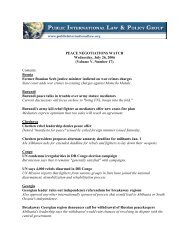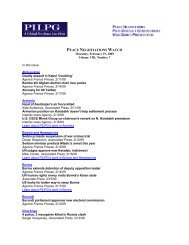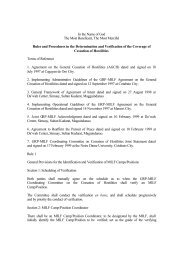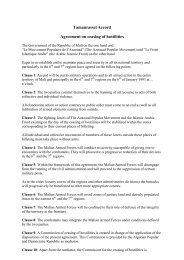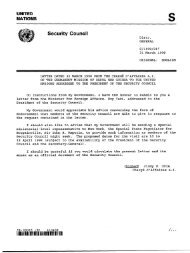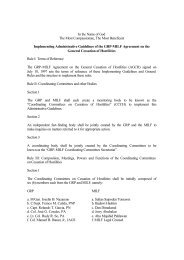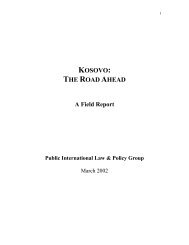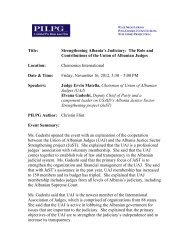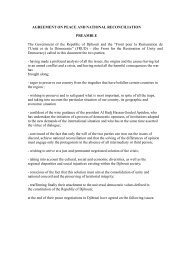Kosovo Albanian Delegation Negotiation Briefing Packet
Kosovo Albanian Delegation Negotiation Briefing Packet
Kosovo Albanian Delegation Negotiation Briefing Packet
You also want an ePaper? Increase the reach of your titles
YUMPU automatically turns print PDFs into web optimized ePapers that Google loves.
14<br />
• All Serbs who lived in <strong>Kosovo</strong> prior to 1989 have the right to return but only if they<br />
are prepared to accept citizenship in an independent <strong>Kosovo</strong>.<br />
• Serbs and other minorities (“communities”) are entitled to all generally accepted<br />
minority rights but no special status, privileges or broadly defined political vetoes.<br />
• Serbs are entitled to compensation for injuries suffered during or after the 1998-1999<br />
conflict only if <strong>Albanian</strong>s receive full compensation.<br />
Acceptable Minimums:<br />
• Provided they accept status as <strong>Kosovo</strong> residents, Serbs living compactly in <strong>Kosovo</strong><br />
would be allowed certain cultural rights and local autonomy, including use of their<br />
own language, schools, medical facilities and possibly police.<br />
• Compensation dropped by both sides.<br />
Background<br />
The issue of Serbs in <strong>Kosovo</strong> includes the return of Serbs driven out by <strong>Albanian</strong> revenge<br />
attacks after the 1999 conflict and what rights Serbs should have in the future <strong>Kosovo</strong>.<br />
(A note on terminology: Serbs insist they are not a minority in <strong>Kosovo</strong>, citing the fact<br />
that they are a majority in the larger Serbian community they consider <strong>Kosovo</strong> to be part<br />
of. The agreed term of art has become “communities.”)<br />
The numbers game will be the first question on refugees and minority rights. The last<br />
(1991) <strong>Kosovo</strong> census showed 194,190 Serbs in <strong>Kosovo</strong>, which amounted to 9.73 percent<br />
of the province's total population. (Since <strong>Albanian</strong>s refused to participate in the census<br />
their numbers were based on estimates.) During the 1990s tens of thousands of Serbs<br />
came to <strong>Kosovo</strong>, either to take jobs from which <strong>Albanian</strong>s had been fired or as refugees<br />
from other places in Yugoslavia. Over the same period several hundred thousand<br />
<strong>Albanian</strong>s left <strong>Kosovo</strong>—for jobs in Western Europe say the Serbs, to escape Serb<br />
repression say the <strong>Albanian</strong>s. How many of these <strong>Albanian</strong>s subsequently returned to<br />
<strong>Kosovo</strong> is unclear. After 1999 somewhere between 100,000 and 150,000 Serbs fled<br />
<strong>Kosovo</strong> to escape <strong>Albanian</strong> revenge attacks or because—as refugees or recent economic<br />
in-migrants—they knew there would be no place for them in <strong>Kosovo</strong>. In 2002, according<br />
to OSCE data, about 136,000 Serbs remained in <strong>Kosovo</strong>, about five percent of the total<br />
population. Almost all lived separately from <strong>Albanian</strong>s, either in enclaves in the southern<br />
and central parts of <strong>Kosovo</strong> or in the north. Perhaps half of these remaining Serbs had<br />
fled from homes elsewhere in <strong>Kosovo</strong>.<br />
Security and legitimacy will be at the heart of the negotiation over return. Although the<br />
security environment for Serbs and minorities in <strong>Kosovo</strong> has been improving over the<br />
past year or so, the recent increase in violence—whatever its source—shows that Serbs<br />
still cannot live normally in contemporary <strong>Kosovo</strong> south of the Ibar river <strong>Kosovo</strong> without<br />
international protection. Historically, the Serb community in <strong>Kosovo</strong> has been declining<br />
for many years and this trend will continue whatever happens with regard to final status.<br />
Nevertheless, in the short run the greater is the international security presence in <strong>Kosovo</strong><br />
the greater will be the likelihood of a significant Serb population remaining or returning<br />
to <strong>Kosovo</strong>. <strong>Albanian</strong>s will be willing to agree to provisions allowing all legitimate<br />
<strong>Kosovo</strong> Serb residents to return, except for those who committed crimes during the



